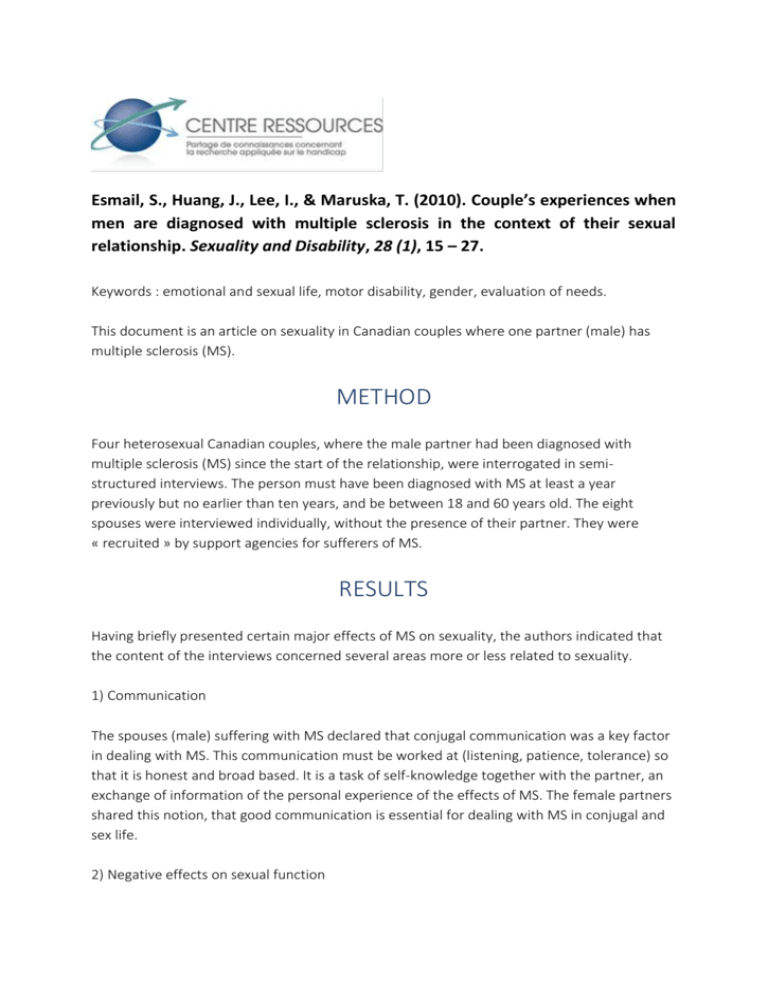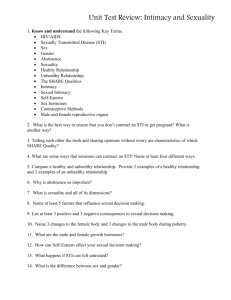
Esmail, S., Huang, J., Lee, I., & Maruska, T. (2010). Couple’s experiences when
men are diagnosed with multiple sclerosis in the context of their sexual
relationship. Sexuality and Disability, 28 (1), 15 – 27.
Keywords : emotional and sexual life, motor disability, gender, evaluation of needs.
This document is an article on sexuality in Canadian couples where one partner (male) has
multiple sclerosis (MS).
METHOD
Four heterosexual Canadian couples, where the male partner had been diagnosed with
multiple sclerosis (MS) since the start of the relationship, were interrogated in semistructured interviews. The person must have been diagnosed with MS at least a year
previously but no earlier than ten years, and be between 18 and 60 years old. The eight
spouses were interviewed individually, without the presence of their partner. They were
« recruited » by support agencies for sufferers of MS.
RESULTS
Having briefly presented certain major effects of MS on sexuality, the authors indicated that
the content of the interviews concerned several areas more or less related to sexuality.
1) Communication
The spouses (male) suffering with MS declared that conjugal communication was a key factor
in dealing with MS. This communication must be worked at (listening, patience, tolerance) so
that it is honest and broad based. It is a task of self-knowledge together with the partner, an
exchange of information of the personal experience of the effects of MS. The female partners
shared this notion, that good communication is essential for dealing with MS in conjugal and
sex life.
2) Negative effects on sexual function
All of the men interviewed declared a negative effect on their sexual function. A reduced
sensitivity and fatigue participated in a loss of energy for sexual activity and a lowering of
libido. Certain techniques were used to compensate for these problems, for example the use
of sex toys and adapted positions during intercourse. These difficulties appeared secondary to
the establishing of a strong link of intimacy. No information was given by the authors as to
what constitutes this « strong link ».
All of the women interviewed stated that MS has had a negative impact on their sex life.
Although some of them declared that they still had a sex life, it was greatly reduced. This drop
in frequency was sometimes perceived as being due to lack of interest, and a certain
frustration could become apparent. Nonetheless, they declared that greater intimacy and
shared emotions since the onset of MS are more important than sex.
3) Traditional roles (interviews with the male partner)
Several of the men interviewed declared that their traditional role in the family has changed
since the onset of MS; they contribute less to family income. They sometimes feel they are a
burden on the female partner who is described as more of as a « caregiver », this role being
perceived negatively by the man. As concerns their sex life, they stated that their partner was
more inclined to take the initiative in proposing sex. The women without MS interrogated
declared that their role as caregiver lessened their sexual desire.
4) Acceptance of MS by the partner (interviews with men)
According to the male partners, this acceptance constitutes a major support in dealing with MS.
The fact that their partner has stayed in the couple despite the MS and continues to consider
them as sexual partners is a source of motivation when dealing personally with MS.
RECOMMENDATIONS
The authors consider that the results of the study should be taken into account by health
professionals when dealing with couples where one partner has MS. These results lead to a
better understanding of the social and conjugal consequences of MS. They call for better
communication between partners. One of the options raised concerned sex toys and
medication which might contribute to or enhance the couple’s sex life.
CRITICISM
Although the article raised some interesting points, the analyses were not based on extracts
from the interviews; this in turns raises doubts as to the pertinence of some of the analyses.
The fact that we do not have precise characteristics for the four couples (form of partnership,
etc) moderates the generalisation of the results.
This document stems from a project by the Centre Ressources and its partners: the CeRHes
(Centre Ressources Handicaps et Sexualités), CH(s)OSE (Collectif Handicap et Sexualité OSE),
CCAH (Comité National Coordination Action Handicap). It was written by Aurélien Berthou
(doctoral student in sociology at the CERLIS, Centre de recherches sur les liens sociaux).








